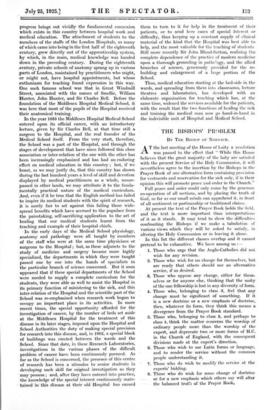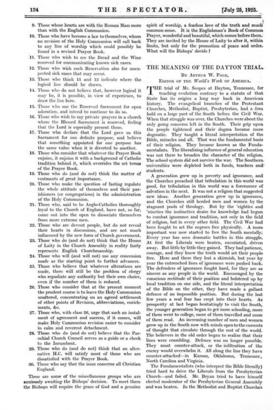THE BISHOPS' PROBLEM
BY THE BISIIOP OF NORWICH.
AT the last meeting of the House of Laity a resolution was passed to the effect that " While this House • believes that the great majority of the laity are satisfied with the present Service of the Holy Communion, it will nevertheless agree to the insertion by the Bishops in the Prayer Book of one alternative form containing provision for vestments and reservation for the sick only, if in their opinion this will promote peace and order in the Church."
Full peace and order could only come by the generous co-operation of all sections, and by placing the truth of God, so far as our small minds can apprehend it, in front of all sentiment or partisanship or traditional claims.
At present the text of the Prayer Book holds the field, and the text is more important than interpretations of it as it stands. It may tend to show the difficulties confronting the Bishops if we make a tabulation of various views which they will be asked to satisfy, in altering the Holy Communion or in leaving it alone.
In this list the different classes overlap and it cannot pretend to be exhaustive. We have among us :- 1. Those who urge that the Anglo-Catholics did not wish for any revision.
2. Those who wish for no change for themselves, but are ready that others should use an alternative service, if so desired.
8. Those who oppose any change, either for them- selves or for anyone else, thinking that the unity of the one fellowship is lost in any diversity of form.
4. Those who, belonging to class 8, feel that any change must be significant of something. If it is a new doctrine or a new emphasis of doctrine, then, whatever its form, they think this means a divergence from the Prayer Book standard.
5. Those who, belonging to class 8, and perhaps to class 4, think the matter concerns the worship of ordinary people more than the worship of the expert, and deprecate two or more forms of H.C. in the Church of England, with the consequent divisions made at the expert's direction.
6. Those who wish to use Latin forms or language, and to render the service without the common people understanding it.
7. Those who do wish to modify the service at the experts' bidding.
8. 'Those who do wish for some change of doctrine or for a new emphasis which others say will alter the balanced truth of the Prayer Book. 9. Those whose hearts are with the Roman Mass more than with the English Communion.
10. Those who have become a law to themselves, whom no revision of the Holy Communion will call back to any line of worship which could possibly be found in a revised Prayer Book.
11. Those who wish to see the Bread and the Wine reserved for communicating known sick cases.
12. Those who wish such Reservation also for unex- pected sick cases that may occur.
13. Those who think 11 and 12 indicate where the logical line should be drawn.
14. Those who do not believe that, however logical it may be, it is possible, in view of experience, to draw the line here.
15. Those who use the Reserved Sacrament for open adoration, and intend to continue to do so.
16. Those who wish to say private prayers in a church where the Blessed Sacrament is reserved, feeling that the Lord is especially present there.
17. Those who declare that the Lord gave us this Sacrament for one definite purpose, and believe that something appointed for one purpose has the same value when it is diverted to another.
18. Those who consider that whatever the Prayer Book enjoins, it enjoins it with a background of Catholic tradition behind it, which overrides the set terms of the Prayer Book.
19. Those who do (and do not) think the matter of vestments of great importance.
20. Those who make the question of fasting regulate the whole attitude of themselves and their par- ishioners (or congregations) in the administration of the Holy Communion.
21. Those who, said to be Anglo-Catholics thoroughly loyal to the Church of England, have not, so far, come out into the open to dissociate themselves from more extreme men.
22. Those who are devout people, but do not reveal their hearts in discussions, and are not much influenced by the new form of Church government.
23. Those who do (and do not) think that the House of Laity in the Church Assembly in reality fairly represents English Churclunanship.
24. Those who will (and will not) use any concession made as the starting point to further advances.
25. Those who believe that whatever alterations are made, there will still be the problem of clergy who repudiate any authority but their own choice, even if the number of them is reduced.
26. Those who consider that at the present moment the prudent course is to leave the Holy Communion unaltered, concentrating on an agreed settlement of other points of Revision, abbreviations, enrich- ments, &c.
27. Those who, with class 26, urge that such an instal- ment of agreement and success, if it comes, will make Holy Communion revision easier to consider in calm and reverent detachment.
28. Those who do (and do not) believe that the Par- ochial Church Council serves as a guide or a check to the Incumbent.
29 Those who do (and do not) think that an alter- native H.C. will satisfy most of those who are dissatisfied with the Prayer Book.
30. Those who say that the issue concerns all Christian England.
These are some of the miscellaneous groups who are anxiously awaiting the Bishops' decision. To meet them the Bishops will require the grace of God and a genuine spirit of worship, a fearless love of the truth and much common sense. It is the Englishman's Book of Common Prayer, wonderful and beautiful, which comes before them. They are invited by the House of Laity to alter it, within limits, but only for the promotion of peace and order. What will the Bishops' decide ?



























































 Previous page
Previous page